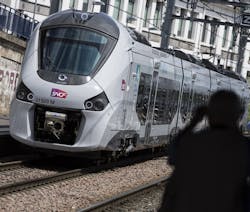France: Alstom Delivering the First Régiolis Train in Aquitaine
Régiolis, the first next-generation regional train, was delivered July 4 to the Aquitaine Region in the presence of Regional Chairman Alain Rousset, SNCF Chairman Guillaume Pépy, and Alstom Transport Président Henri Poupart-Lafarge.
The first trainset will be presented to elected officials and association chairmen at the Bordeaux Saint-Jean station, prior to travelling from Bordeaux to Langon. It will also be presented to the general public at the Bordeaux train station.
The amount of passengers using regional trains – or TER1 s - in France rose by 55 percent since 2002 and the trend was further confirmed in 2012 with an additional 5 percent ridership increase. To meet that demand, the Regions have invested €2.6 billion in next-generation regional trains from 2002 to 2012. As of today, 182 Régiolis trains have been ordered by 12 French Regions, as part of the contract signed between Alstom and SNCF in 2009.
The first Régiolis trains have so far travelled over 200,000 km and will have completed their dynamic test phase in September 2013. They will be put into service as soon as they receive their commercial operation authorization (AMEC - Autorisations de Mise en Exploitation Commerciale), to be issued by the French Rail Safety Public Authority (EPSF).
Alstom teams will take part in training the drivers and maintenance teams. Thanks to the hard work of all players in France’s railway sector, close to 100 Régiolis trainsets will be delivered by late 2014. Trainsets in Alsace, Aquitaine, Lower Normandy, Lorraine and Picardy regions will be made available starting in 2013. Initial commercial operation will begin in 2014.
Régiolis trains stem from Alstom’s Coradia range. They are modular: they come in three lengths (56, 72 or 110 metres), feature four degrees of comfort in accordance with the distances being travelled (suburban, regional, inter-city, and trains for nationwide balance) and are equipped with a bimodal (diesel/electric) or electric engine. This is an ecological, cost-saving train thanks to its low energy use and reduced maintenance costs.
